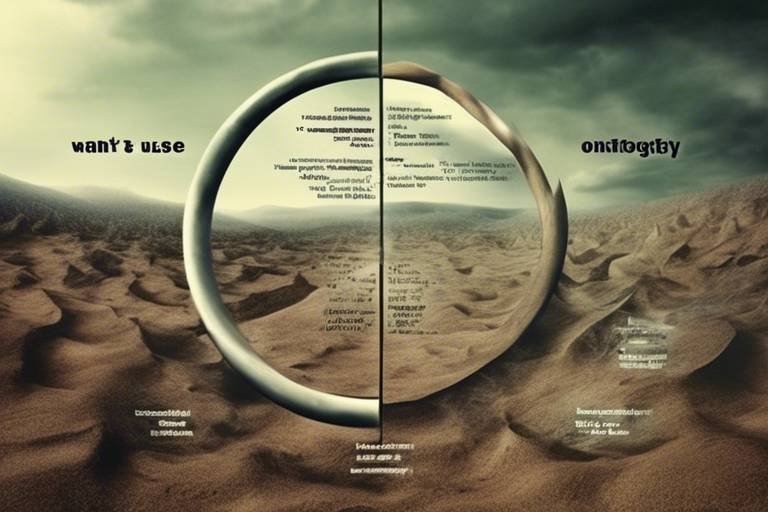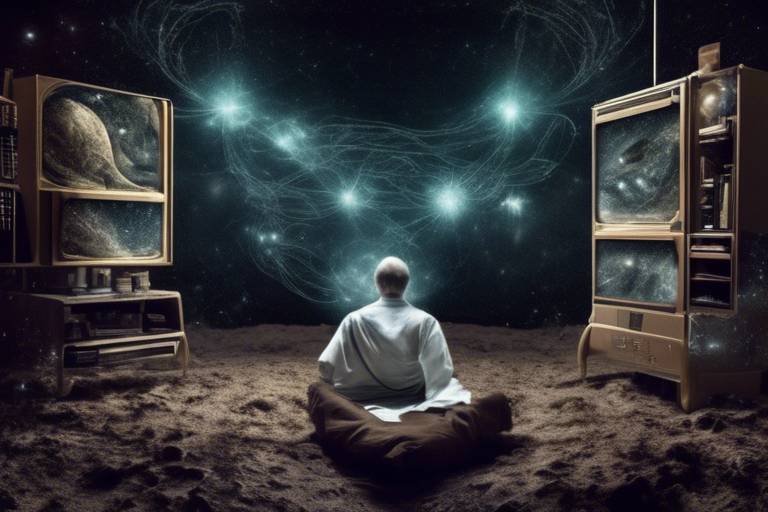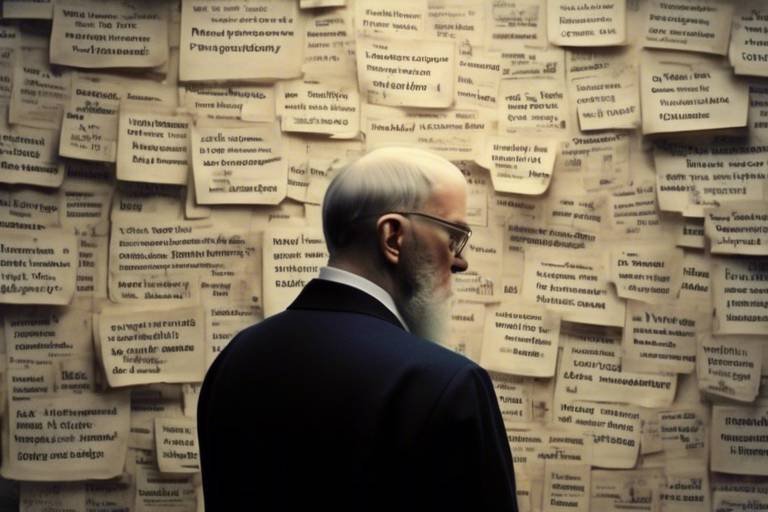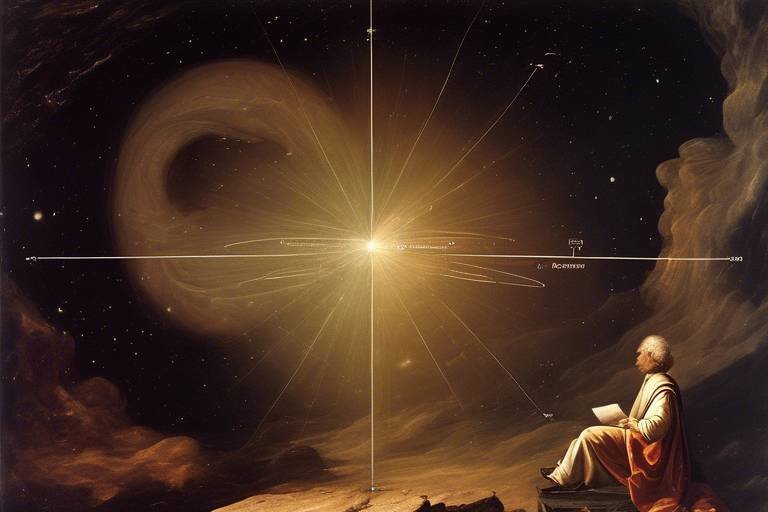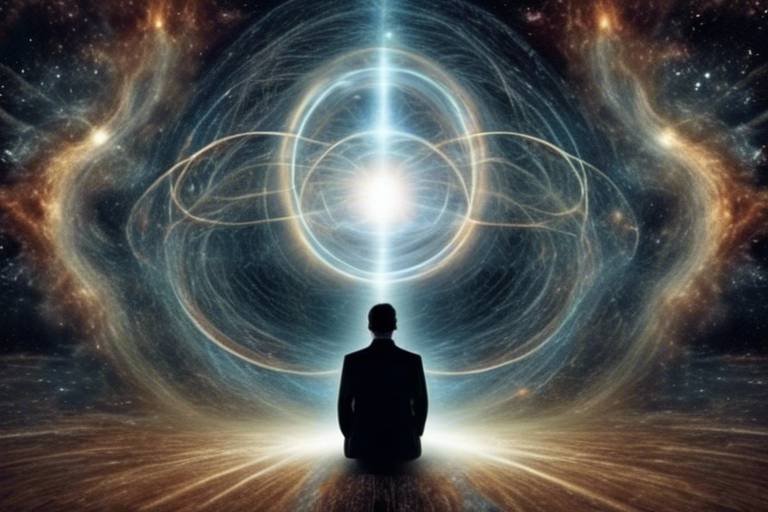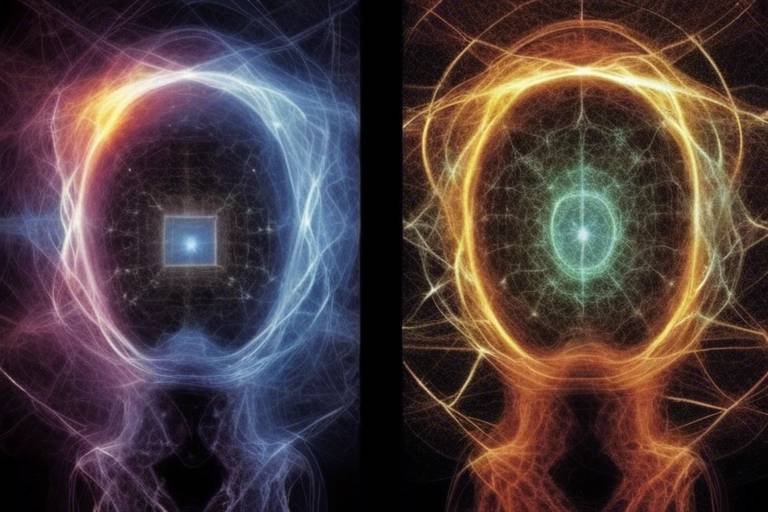Five Most Interesting Ontological Theories
This article explores five compelling ontological theories that shape our understanding of existence and reality, delving into their implications and significance in philosophy and beyond. Ontology, the study of being and existence, is a vast field that invites us to ponder profound questions about what it means to exist. Have you ever wondered why we are here or what constitutes reality? These ontological theories not only provide intriguing insights but also challenge our perceptions of the world around us. Let’s embark on a journey through these fascinating concepts, each offering a unique lens through which we can view existence.
Substance theory posits that substances are the fundamental entities in the universe. Imagine the universe as a vast building, where substances are the bricks that hold everything together. Historically, this theory can be traced back to philosophers like Aristotle, who argued that substances are the primary kind of being. In contemporary metaphysical discussions, substance theory remains influential, as it helps us grapple with questions about identity and persistence over time. For instance, consider a tree: it is not just a collection of leaves and branches but a substance that endures despite seasonal changes. This enduring quality raises questions about what it means for something to 'be' and how we define the essence of entities in our world.
Bundle theory challenges the notion of substances, proposing that objects are merely collections of properties. Picture a bundle of sticks tied together – without the individual sticks, there is no bundle. This theory suggests that objects do not possess an underlying substance; instead, they are defined by their attributes. For example, a red apple is not a substance in itself but a collection of properties such as redness, roundness, and sweetness. This perspective can lead to intriguing implications for identity and existence. If objects are just bundles of properties, what does that mean for their identity? Are we merely bundles of experiences, emotions, and memories? These questions encourage a deeper exploration of how we perceive ourselves and the world around us.
Process philosophy emphasizes becoming over being, arguing that change is fundamental to reality. Imagine a river that is constantly flowing – it is never the same at any two moments. This philosophical approach, championed by thinkers like Alfred North Whitehead, suggests that the essence of reality lies in the processes and events that shape existence. In a world where everything is in flux, this theory invites us to consider how change influences our understanding of identity and existence. What if, instead of viewing ourselves as static beings, we embraced the idea that we are always in a state of becoming? This perspective can radically alter how we approach life, relationships, and our aspirations.
Existentialism focuses on individual existence and the search for meaning. Think of it as a personal journey through the labyrinth of life, where each individual must navigate their path. Key thinkers like Jean-Paul Sartre and Simone de Beauvoir emphasized the importance of personal choice and responsibility in shaping one’s existence. Existentialism raises profound questions about the nature of freedom and the weight of our decisions. Are we the authors of our destiny, or are we merely products of our circumstances? This philosophical approach encourages us to confront the absurdity of life and find our own meaning in a seemingly indifferent universe.
Modal realism suggests that all possible worlds are as real as the actual world. Imagine a vast multiverse, where every choice you make spawns a new reality. This theory, popularized by philosopher David Lewis, posits that every possible scenario exists in its own separate world. While this idea may sound like science fiction, it raises fascinating questions about the nature of existence and reality. If all possible worlds are real, what implications does this have for our understanding of truth and possibility? It challenges us to consider the breadth of existence beyond our immediate experiences and opens up discussions about fate, choice, and the fabric of reality itself.
- What is ontology? Ontology is the branch of philosophy that studies the nature of being, existence, and reality.
- Why are ontological theories important? They help us understand the fundamental nature of reality and our place within it.
- How do these theories impact everyday life? They influence our perceptions, beliefs, and the way we interact with the world around us.

1. Substance Theory
This article explores five compelling ontological theories that shape our understanding of existence and reality, delving into their implications and significance in philosophy and beyond.
Substance theory, at its core, posits that substances are the fundamental entities that compose reality. Think of substances as the building blocks of everything we perceive; they are the things that exist independently and have their own distinct properties. Historically, this theory can be traced back to the ancient Greeks, notably Aristotle, who defined substance as that which exists in itself, contrasting it with properties that exist only in relation to substances. For Aristotle, a substance could be a tree, a rock, or even a person, each having its unique characteristics that define its essence.
In contemporary metaphysical discussions, substance theory continues to hold significant sway. It serves as a foundation for various philosophical inquiries, influencing how we understand identity, change, and permanence. For instance, when we talk about an object, we often refer to its substance—what it is made of and what makes it the entity it is. This brings us to an important question: if a substance changes, does it remain the same substance? This dilemma leads to fascinating discussions about persistence and identity over time.
Consider the following table that summarizes key aspects of substance theory:
| Aspect | Description |
|---|---|
| Definition | Entities that exist independently and have distinct properties. |
| Historical Roots | Originated with ancient Greek philosophers, especially Aristotle. |
| Contemporary Relevance | Influences discussions on identity, change, and existence. |
Moreover, substance theory prompts us to think about the nature of reality itself. Are substances the only things that exist, or do properties and relations also play a crucial role? This inquiry leads to contrasting theories, such as bundle theory, which suggests that objects are merely collections of properties without any underlying substance. This debate is not just academic; it has real-world implications, influencing areas such as science, ethics, and even everyday decision-making.
In conclusion, substance theory invites us to ponder profound questions about existence. It challenges us to consider what it means for something to 'be' and how we define the essence of things. As we continue to explore the fabric of reality, substance theory remains a vital thread in the tapestry of philosophical thought, urging us to seek deeper understanding of the world around us.
- What is substance theory?
Substance theory posits that substances are the fundamental entities that exist independently and possess distinct properties. - Who is the key philosopher associated with substance theory?
Aristotle is one of the primary philosophers associated with substance theory, defining it in his works. - How does substance theory relate to modern philosophy?
Substance theory influences contemporary discussions on identity, change, and the nature of reality.

2. Bundle Theory
Bundle Theory is a fascinating ontological perspective that flips traditional notions of existence on their head. Instead of viewing objects as distinct entities with inherent properties, Bundle Theory suggests that what we consider to be an object is actually just a collection of properties or characteristics. Imagine a bundle of sticks; each stick represents a different property, and together they form what we perceive as a single object. This idea challenges our intuitive understanding of identity and existence, raising questions about what it truly means to be.
The historical roots of Bundle Theory can be traced back to philosophers like David Hume, who argued that our perceptions are merely bundles of qualities. According to Hume, we never experience a substance directly; instead, we only encounter a series of impressions that we associate together. For instance, when you see a red apple, you’re not perceiving an apple as a solid entity but rather a collection of properties—redness, roundness, and sweetness—all bundled together in your mind. This perspective invites us to reconsider how we categorize and understand the world around us.
One of the most compelling implications of Bundle Theory is its impact on the concept of identity. If objects are merely bundles of properties, then what happens to the idea of a stable, unchanging identity? Consider a person: are they the same individual throughout their life, or are they simply a bundle of experiences, thoughts, and feelings that change over time? This leads to intriguing philosophical discussions about personal identity and the nature of self. It raises profound questions:
- Is a person's identity tied to their physical body, or can it change as their experiences do?
- How do we reconcile the continuity of identity with the constant flux of our properties?
Moreover, Bundle Theory has significant implications for our understanding of existence itself. If objects do not possess an underlying substance, then the way we perceive reality may be more fluid and interconnected than previously thought. This notion can open up new avenues of exploration in various fields, from metaphysics to psychology. For example, in the realm of social identity, one might argue that our identities are shaped by the societal properties we embody, which can change based on context and experience.
In conclusion, Bundle Theory invites us to rethink our perceptions of reality, identity, and existence. By emphasizing the collection of properties over a singular substance, it challenges us to explore the intricate web of relationships that define objects and ourselves. The implications of this theory ripple through philosophy, psychology, and beyond, prompting us to question the very nature of what it means to exist.
- What is Bundle Theory? Bundle Theory posits that objects are not substances but rather collections of properties that we perceive as unified entities.
- Who are the key philosophers associated with Bundle Theory? David Hume is a prominent figure associated with this theory, challenging traditional notions of substance and identity.
- How does Bundle Theory affect our understanding of identity? It suggests that identity may not be fixed but rather a dynamic collection of experiences and properties that can change over time.
- What are the implications of Bundle Theory in modern philosophy? Bundle Theory encourages a reevaluation of how we understand existence, identity, and the relationships between objects in our world.

3. Process Philosophy
Process philosophy is a fascinating lens through which we can view existence, emphasizing the idea that reality is not a static entity but rather a dynamic process. Imagine a river, constantly flowing and changing, rather than a solid block of ice. This perspective reshapes our understanding of being, suggesting that becoming is more fundamental than being. The roots of process philosophy can be traced back to the works of philosophers like Heraclitus, who famously stated that "you cannot step into the same river twice," highlighting the ever-changing nature of reality.
One of the most influential figures in process philosophy is Alfred North Whitehead. He proposed that the universe is composed of events or "actual occasions" rather than isolated substances. This radical shift invites us to think about existence in terms of relationships and interactions. For Whitehead, every entity is interrelated, and the process of becoming is what gives rise to the essence of things. It’s as if every moment is a brushstroke on the canvas of existence, creating an intricate and beautiful masterpiece that is constantly evolving.
In process philosophy, the implications stretch far beyond metaphysics. It touches on ethics, ecology, and even our understanding of time. For instance, if we accept that everything is in a state of flux, it compels us to reconsider our approach to issues like environmental sustainability. Rather than viewing nature as a collection of resources to exploit, we begin to see it as a living entity with which we are in a relationship. This perspective encourages a sense of responsibility and interconnectedness, urging us to act with care and consideration.
Furthermore, process philosophy challenges the traditional dichotomy of mind and body. Instead of viewing them as separate substances, it suggests that they are part of a continuous process of interaction. This idea resonates with many contemporary discussions in philosophy of mind and cognitive science, where the focus is on how mental states emerge from physical processes. By embracing a process-oriented view, we open up new avenues for understanding consciousness and existence.
As we delve deeper into the implications of process philosophy, we can see how it invites us to embrace uncertainty and change. In a world that often seeks stability and certainty, this philosophy offers a refreshing perspective, reminding us that change is not something to be feared, but rather an integral part of life. Just like the seasons change, so too does our understanding of existence evolve. This fluidity can be both thrilling and daunting, but it ultimately enriches our experience of being.
In summary, process philosophy provides a compelling framework for understanding reality as an interconnected web of events and relationships. It encourages us to embrace the dynamic nature of existence and to recognize our place within the larger tapestry of life. By shifting our focus from static entities to processes, we gain a deeper appreciation for the complexity and beauty of the world around us.
- What is the main idea behind process philosophy?
Process philosophy posits that reality is fundamentally about change and becoming, rather than static existence. - Who are the key figures in process philosophy?
Alfred North Whitehead is one of the most prominent figures, alongside others like Henri Bergson. - How does process philosophy impact our understanding of ethics?
It encourages a sense of interconnectivity and responsibility towards our environment and relationships. - Can process philosophy be applied to modern science?
Yes, it has implications in areas like cognitive science and ecology, promoting a holistic view of existence.

4. Existentialism
Existentialism is a fascinating philosophical movement that dives deep into the essence of individual existence and the quest for meaning in a seemingly indifferent universe. Imagine standing on the edge of a vast ocean, where each wave represents a different choice, and the horizon symbolizes the endless possibilities of life. This is the essence of existentialism, where the individual is not just a passive observer but an active participant in crafting their own destiny. Thinkers like Søren Kierkegaard, Friedrich Nietzsche, and Jean-Paul Sartre have profoundly influenced this school of thought, each bringing their unique perspectives on existence, freedom, and authenticity.
At its core, existentialism emphasizes the idea that existence precedes essence. This means that we are not born with a predetermined purpose; instead, we create our own essence through our choices and actions. Sartre famously declared, "Man is condemned to be free," highlighting the weight of responsibility that comes with freedom. This notion can be both exhilarating and daunting, as it places the burden of meaning squarely on our shoulders. What do we do with our freedom? How do we navigate the chaos of life and find our own path?
One of the key themes in existentialism is the concept of authenticity. To live authentically means to embrace our individuality and make choices that reflect our true selves, rather than conforming to societal expectations. It’s like being a painter with a blank canvas, where every stroke represents a decision that shapes the masterpiece of our lives. But how do we achieve this authenticity? It often involves grappling with feelings of alienation and absurdity, as we confront the inherent meaninglessness of existence.
Existentialists argue that in order to live authentically, one must confront the absurdity of life. This concept, popularized by Albert Camus, suggests that while life may lack inherent meaning, we have the power to create our own significance. Picture a tightrope walker balancing high above the ground; each step is a choice, and the potential for falling symbolizes the risks we take in our search for meaning. The struggle itself becomes a defining aspect of our existence.
Moreover, existentialism has significantly impacted various fields beyond philosophy, including literature, psychology, and even art. The themes of existential angst and the search for meaning resonate in the works of authors like Franz Kafka and Virginia Woolf, who explore the complexities of human experience. In psychology, existential therapy focuses on helping individuals find meaning in their lives, emphasizing personal responsibility and the importance of choice.
In conclusion, existentialism invites us to embark on a journey of self-discovery, urging us to confront our freedom, embrace our individuality, and seek meaning in a world that often seems chaotic and indifferent. It's a call to live deliberately and authentically, reminding us that while we may not have all the answers, the questions we ask and the choices we make are what truly define our existence.
- What is the main idea of existentialism? Existentialism emphasizes individual existence, freedom, and the search for meaning in a world that may lack inherent significance.
- Who are some key figures in existentialism? Major thinkers include Søren Kierkegaard, Friedrich Nietzsche, Jean-Paul Sartre, and Albert Camus.
- How does existentialism relate to authenticity? Authenticity in existentialism means living in accordance with one's true self, making choices that reflect personal values rather than societal expectations.
- What is the significance of absurdity in existential thought? Absurdity highlights the conflict between our desire for meaning and the indifferent nature of the universe, prompting individuals to create their own significance.

5. Modal Realism
Modal realism is a fascinating ontological theory that proposes the existence of multiple possible worlds, all of which are as real as our own actual world. Imagine a vast multiverse where every choice you didn't make leads to the creation of an entirely new universe. This theory challenges our conventional understanding of reality, suggesting that every possible scenario exists somewhere, somehow. It's a bold and somewhat mind-bending idea that has profound implications for how we think about existence, identity, and the nature of reality itself.
The roots of modal realism can be traced back to the work of philosopher David Lewis, who argued that possible worlds are not just useful fictions but rather concrete entities that exist in their own right. According to Lewis, these worlds are not mere abstractions; they are just as real as the world we inhabit. This perspective opens up a treasure trove of questions: If every possible world exists, what does that mean for our understanding of choice and free will? Are we merely players in a grand cosmic play, where every decision spawns a new narrative?
One of the most intriguing aspects of modal realism is its implications for identity. If there are infinite versions of you living in countless worlds, how do we define who you truly are? Are you the sum of your experiences in this world, or does your identity stretch across all possible lives you could have lived? This theory forces us to reconsider the very essence of what it means to be an individual. It raises questions about the nature of existence itself: Are we defined by our choices, or is there a deeper, more intrinsic quality that unites all versions of ourselves?
Critics of modal realism argue that the theory leads to a kind of ontological extravagance, positing the existence of too many entities without sufficient justification. They question whether we really need to accept the reality of all these possible worlds to explain our experiences. For instance, some philosophers suggest that a simpler explanation could suffice, one that does not require the existence of an infinite number of worlds to account for the richness of our experiences. This debate between modal realists and their critics highlights the ongoing tension in philosophy between simplicity and completeness.
Despite the criticisms, modal realism has sparked lively discussions in various fields, including metaphysics, ethics, and even science fiction. The concept challenges us to think about the nature of reality in new and exciting ways. It invites us to ponder questions such as:
- What if every decision we make creates a new universe?
- How do our lives intersect with those of our counterparts in other worlds?
- Can we ever truly know the extent of our existence across these myriad realities?
In conclusion, modal realism offers a rich and provocative lens through which to explore existence and reality. By embracing the idea of multiple worlds, we can expand our understanding of identity, choice, and the very fabric of what it means to be. As we continue to grapple with these complex ideas, one thing remains clear: the exploration of modal realism is far from over, and its implications will likely resonate in philosophical discussions for years to come.
Q: What is modal realism?
A: Modal realism is the philosophical theory that all possible worlds are as real as the actual world we live in, suggesting that every possible scenario exists in its own universe.
Q: Who is the main proponent of modal realism?
A: The main proponent of modal realism is philosopher David Lewis, who argued that possible worlds are concrete entities rather than mere abstractions.
Q: What are some implications of modal realism?
A: Modal realism raises questions about identity, free will, and the nature of existence itself, challenging us to reconsider what it means to be an individual.
Q: What are the criticisms of modal realism?
A: Critics argue that modal realism posits too many entities without sufficient justification and that simpler explanations may account for our experiences without requiring the existence of multiple worlds.

6. Idealism
Idealism is a philosophical theory that asserts that reality is fundamentally mental or immaterial. It challenges our conventional understanding of existence, suggesting that what we perceive as the physical world is, in fact, a construct of the mind. Imagine looking at a painting; the canvas and paint are merely the medium, but it is the artist's vision and the viewer's interpretation that truly bring the artwork to life. Similarly, idealism posits that our thoughts, perceptions, and consciousness shape the very fabric of reality.
The roots of idealism can be traced back to ancient philosophers like Plato, who proposed the existence of a realm of forms or ideas that represent the truest essence of objects. For Plato, the physical world was just a shadow of this higher reality. Fast forward to the modern era, and we find thinkers like George Berkeley, who famously declared, "To be is to be perceived." This radical notion implies that objects only exist in relation to our perceptions of them, leading to the conclusion that the material world is dependent on the mind.
In contemporary discussions, idealism stands in stark contrast to materialism, which posits that physical matter is the primary substance of reality. While materialists argue that everything can be explained through physical processes and interactions, idealists contend that our mental experiences are equally significant. This dichotomy raises intriguing questions: Is the mind merely a byproduct of physical processes, or does it play a crucial role in shaping our reality? The implications of idealism extend beyond philosophy; they influence fields such as psychology, art, and even quantum physics, where the observer effect suggests that the act of observation can alter the state of a system.
One of the most compelling aspects of idealism is its emphasis on the subjective nature of experience. Each person's perception of reality is unique, colored by their thoughts, emotions, and cultural background. This leads to a rich tapestry of interpretations, creating a world that is not only diverse but also deeply interconnected. In this sense, idealism encourages us to embrace our differences and recognize that our individual experiences contribute to a collective understanding of existence.
However, idealism is not without its critics. Detractors argue that it risks falling into solipsism, the idea that only one's mind is sure to exist, which can lead to a dismissive attitude towards the external world. To counter this, idealists often highlight the intersubjective nature of reality, where shared experiences and communal understandings form a bridge between individual minds. This perspective fosters a sense of unity, suggesting that while our perceptions may differ, they collectively shape a shared reality.
In summary, idealism invites us to reconsider the nature of existence and the role of consciousness in shaping our understanding of reality. By emphasizing the mental and immaterial aspects of life, it challenges us to explore the depths of our perceptions and the interconnectedness of our experiences. As we navigate through the complexities of existence, idealism serves as a reminder that reality is not just a physical phenomenon, but a rich tapestry woven from the threads of our thoughts and imaginations.
- What is idealism? Idealism is a philosophical theory that posits that reality is fundamentally mental or immaterial, emphasizing the role of consciousness in shaping our understanding of existence.
- Who are the key figures in idealism? Notable philosophers associated with idealism include Plato, George Berkeley, and Immanuel Kant, each contributing unique perspectives to the theory.
- How does idealism differ from materialism? While idealism asserts that mental experiences shape reality, materialism claims that physical matter is the primary substance of existence, focusing on the tangible aspects of the world.
- What are the implications of idealism in modern thought? Idealism influences various fields, including psychology, art, and quantum physics, prompting discussions about the nature of reality and the role of perception.

7. Realism vs. Anti-Realism
When we dive into the philosophical waters of realism and anti-realism, we're essentially exploring two contrasting views of existence that have significant implications in various fields, from science to ethics. Realism asserts that an objective reality exists independent of our perceptions or beliefs. Think of it like a sturdy tree standing tall in a forest, regardless of whether anyone is there to admire it. On the other hand, anti-realism challenges this notion, suggesting that our understanding of reality is significantly shaped by our perspectives, experiences, and contexts. It's akin to viewing that same tree through a foggy window—what you see might be influenced by the condensation on the glass.
The debate between these two positions is not just academic; it resonates deeply in our everyday lives. For instance, consider the nature of scientific theories. Realists argue that the success of scientific theories indicates that they are true representations of an objective reality. They might say, "Look at how technology has advanced through our understanding of physics; it must reflect some underlying truth!" Conversely, anti-realists might counter that scientific theories are merely useful tools for navigating the world, not definitive truths. They might ask, "Isn't it possible that our theories are just models that help us make sense of our experiences?"
This philosophical tug-of-war leads us to examine several key areas:
- Science: Realism in science posits that the entities described by scientific theories, such as electrons and black holes, exist independently of our observations. Anti-realists, however, suggest that these entities are constructs of our theories, which may not necessarily reflect an objective reality.
- Ethics: In ethics, realism suggests that moral truths exist independently of human opinion, while anti-realism posits that moral values are subjective and constructed through social interactions.
- Metaphysics: Realism in metaphysics asserts that there are entities beyond our perception that exist in a structured reality, while anti-realism questions the existence of such entities, emphasizing the role of human cognition in shaping our understanding of existence.
The implications of these positions can be profound. For instance, if we lean towards realism, we might adopt a more objective approach to knowledge and truth, believing that there are facts to discover and understand. However, if we find ourselves swayed by anti-realism, we may become more skeptical about claims of absolute truth, recognizing the influence of cultural and personal contexts on our beliefs.
Ultimately, the dialogue between realism and anti-realism invites us to reflect on our own beliefs and assumptions about the world. Are we inclined to see the world as a place filled with objective truths waiting to be uncovered, or do we view it as a complex tapestry woven from subjective experiences and interpretations? This ongoing discussion is not just a philosophical exercise; it shapes how we engage with the world around us, influencing everything from scientific inquiry to moral judgments.

8. Ontological Pluralism
Ontological pluralism is a fascinating theory that suggests the existence of multiple kinds of entities or modes of being. Imagine a world where not everything can be neatly categorized into a single framework. Instead, it embraces the complexity and richness of existence, allowing for various interpretations and understandings of reality. This theory challenges the traditional monistic view, which asserts that there is only one fundamental kind of substance or being. By accepting ontological pluralism, we open ourselves to a broader spectrum of possibilities, fundamentally altering our approach to philosophy and science.
At its core, ontological pluralism recognizes that different contexts might require different ontological commitments. For instance, in the realm of physics, we might focus on particles and forces, while in social sciences, we might prioritize institutions and relationships. This flexibility allows for a more nuanced understanding of reality, where various domains can coexist without the need for a singular, overarching explanation. It’s like having a toolbox filled with diverse tools—each one designed for a specific task, yet all contributing to the larger project of understanding our world.
Moreover, ontological pluralism has significant implications for various fields, including ethics, science, and even art. In ethics, it encourages us to consider multiple perspectives when evaluating moral questions, acknowledging that different cultures and societies may have distinct values and beliefs. In science, it allows for the coexistence of different theories and models, fostering innovation and exploration. Artists, too, can benefit from this pluralistic approach, as it encourages them to draw inspiration from a wide array of influences, resulting in richer and more diverse expressions of creativity.
However, ontological pluralism is not without its criticisms. Some argue that it can lead to relativism, where any belief or interpretation is seen as equally valid, potentially undermining the search for objective truths. Others worry that it might complicate our understanding of reality to the point of confusion, making it difficult to establish a coherent framework for discussion. Yet, proponents believe that acknowledging the complexity of existence is a strength rather than a weakness.
In summary, ontological pluralism invites us to embrace the diversity of existence and to appreciate the variety of ways in which we can understand and interpret reality. By recognizing that there is no one-size-fits-all approach to ontology, we can cultivate a more inclusive and comprehensive view of the world. This perspective not only enriches philosophical discourse but also enhances our daily lives by encouraging open-mindedness and a willingness to explore the unknown.
- What is ontological pluralism? Ontological pluralism is the view that there are many different kinds of entities or modes of being in existence, rather than a single, unified framework.
- How does ontological pluralism differ from monism? Monism asserts that there is only one fundamental kind of substance or being, while ontological pluralism embraces a variety of entities and interpretations.
- What are the implications of ontological pluralism? It affects various fields, including ethics, science, and art, encouraging diverse perspectives and interpretations.
- Can ontological pluralism lead to relativism? Critics argue that it might, but proponents believe it enhances our understanding of complexity rather than undermining objective truths.

9. The Role of Language in Ontology
Language is not just a tool for communication; it’s the very framework through which we construct our understanding of existence. When we talk about ontology, the study of being and existence, we cannot ignore the profound impact that language has on our conceptualizations. Think about it: every time we name something, we are not merely labeling it; we are shaping its identity and our relationship with it. This interplay between language and ontology raises intriguing questions: Can we truly grasp the essence of an object if we lack the words to describe it? Or does language limit our understanding of reality?
Historically, philosophers like Ferdinand de Saussure proposed that the relationship between the signifier (the word) and the signified (the concept) is arbitrary. This idea implies that language is a construct that can shape our perception of reality. For instance, consider how different cultures have unique words for concepts that may not exist in other languages. The Inuit, for example, have multiple words for snow, each describing a different type. This linguistic richness allows them to perceive and interact with their environment in ways that others might not.
Moreover, the structure of a language can influence thought processes. The Sapir-Whorf Hypothesis suggests that the language we speak can affect how we think and perceive the world. If we apply this lens to ontology, we start to see that our understanding of existence could be fundamentally shaped by our linguistic choices. For instance, in languages that use gendered nouns, speakers might perceive objects differently compared to speakers of gender-neutral languages. This raises the question: does our language confine our ontological perspectives?
Additionally, the role of language in ontology can be observed in how we categorize entities. The way we define and classify things helps us navigate our reality. For example, in scientific discourse, the precise use of terminology is vital for clear communication and understanding. Consider the following table that illustrates how language categorizes different forms of existence:
| Category | Examples |
|---|---|
| Physical Entities | Rocks, Trees, Animals |
| Abstract Concepts | Love, Justice, Freedom |
| Social Constructs | Money, Law, Culture |
In this table, we can see how language helps us categorize various forms of existence. Each category is defined by the language we use to describe it, highlighting the inherent connection between language and ontology. Furthermore, the evolution of language itself reflects changes in our understanding of existence. As new concepts emerge, so too does our vocabulary, allowing us to articulate and explore new ontological ideas.
In conclusion, the role of language in ontology is both profound and multifaceted. It shapes our understanding, influences our perceptions, and ultimately defines our reality. As we continue to explore the depths of existence, we must remain aware of how our linguistic frameworks guide and sometimes limit our ontological inquiries. So, next time you ponder the nature of reality, consider the words you use and how they might be shaping your thoughts. After all, in the realm of ontology, language is not just a means of expression; it is a fundamental part of the very fabric of existence.
- How does language influence our perception of reality? Language shapes our understanding of concepts and categories, which in turn influences how we perceive and interact with the world.
- Can we think without language? While some cognitive processes may occur without language, language provides a structure that helps us articulate and refine our thoughts.
- What is the Sapir-Whorf Hypothesis? It is a theory suggesting that the structure of a language affects its speakers' worldview and cognition.
- How does categorization in language affect ontology? The way we categorize entities in language helps us define and understand different aspects of existence, shaping our ontological perspectives.
Frequently Asked Questions
- What is Substance Theory?
Substance Theory is a fundamental ontological perspective that suggests substances are the core entities of reality. It explores how these substances exist independently and how they relate to properties and events. This theory has historical roots in the works of philosophers like Aristotle and has significantly influenced modern metaphysical discussions.
- How does Bundle Theory differ from Substance Theory?
Bundle Theory challenges the idea of substances by proposing that objects do not exist independently but are merely collections or bundles of properties. This means that an object's identity is derived from its attributes rather than from an underlying substance. It raises intriguing questions about existence and identity, suggesting that what we perceive as 'things' are actually just clusters of characteristics.
- What is Process Philosophy?
Process Philosophy is an ontological theory that prioritizes change and becoming over static existence. It posits that reality is a continuous process of development rather than a collection of unchanging substances. This perspective, influenced by thinkers like Alfred North Whitehead, has transformed how we understand time, existence, and the nature of reality itself.
- Can you explain Existentialism?
Existentialism is a philosophical movement that emphasizes individual existence, freedom, and the search for meaning. Key figures like Jean-Paul Sartre and Simone de Beauvoir explored how humans navigate a seemingly indifferent universe, focusing on personal responsibility and the quest for authenticity. This theory has profound implications for how we understand our place in the world.
- What is Modal Realism?
Modal Realism is the theory that all possible worlds are as real as the actual world we live in. Proposed by philosopher David Lewis, it invites us to consider the existence of countless alternative realities and their implications for our understanding of existence and choice. This theory challenges our perception of reality and raises questions about the nature of possibility.
- How does Idealism contrast with Materialism?
Idealism posits that reality is fundamentally mental or immaterial, suggesting that the mind shapes our understanding of existence. In contrast, Materialism asserts that physical substances are the primary reality. This philosophical debate has significant implications for various fields, including science, ethics, and metaphysics, influencing how we interpret our experiences and the world around us.
- What is the debate between Realism and Anti-Realism?
The debate centers on whether an objective reality exists independent of our perceptions. Realism argues for the existence of such a reality, while Anti-Realism questions this notion, suggesting that our understanding is shaped by our experiences and interpretations. This discourse impacts various domains, from scientific inquiry to ethical considerations, challenging us to rethink our assumptions about knowledge and existence.
- What is Ontological Pluralism?
Ontological Pluralism is the view that multiple kinds of entities exist, each with its own mode of being. This perspective encourages a more nuanced understanding of reality, acknowledging that different frameworks can coexist and provide valuable insights. It invites us to explore the richness of existence and the varied ways we can interpret our experiences.
- How does language influence ontology?
Language plays a crucial role in shaping our ontological theories. The way we articulate our thoughts and experiences can influence our understanding of existence and reality. Linguistic frameworks can either clarify or complicate our ontological discussions, highlighting the interplay between language, thought, and the nature of reality.



